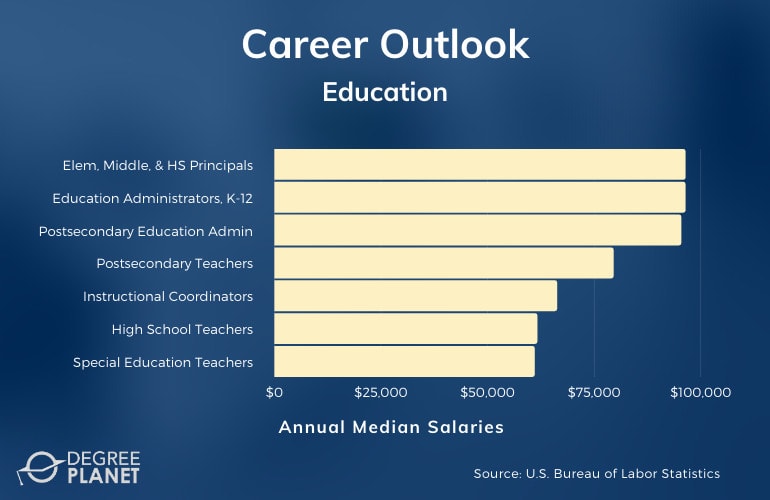With the rise of online classes, self-paced schedules, and test-optional admission criteria, there are a number of online masters in education no GRE programs to choose from.

You can now complete the coursework for an advanced degree completely online and according to your own timetable.
Editorial Listing ShortCode:
A masters in education can help prepare you for employment or advancement in the educational industry. You can build your skills, establish your credentials, and make connections with others in the field.
Online Masters in Education Programs
There is a variety of options when it comes to masters education programs. You can choose from multiple degrees, specialties, licenses, concentrations, and certification programs.
Select the program that most interests you to jump to that section of the guide:
- Education
- Early Childhood Education
- Education Administration
- Elementary Education
- Higher Education
- Special Education
Regardless of the specialty you select, you will still receive a strong foundation in business administration and related courses.
Online Master of Education (M.Ed.)

A masters in education online is a generalist degree. This means that it doesn’t train you for a specific career.
Instead, a generalist degree teaches a broad range of skills that can be applied to many different work environments, including schools, childcare centers, community outreach programs, and more.
An M.Ed. curriculum is usually a mix of core classes and electives. The core classes often cover important theories and practices in education while the electives serve as your chance to explore niche interests or specializations.
Editorial Listing ShortCode:
Specializations can include elementary education, secondary education, school counseling, educational technology, and special education. The usual M.Ed. program is around 30 credits, but specialization fields of study can require anywhere from 50 credits to 60 credits.
Some M.Ed. programs have a fieldwork component. In a teaching program, this usually consists of supervised hours in a classroom. These hours might be called practicums, residencies, internships, or general fieldwork opportunities.
Online Masters in Early Childhood Education

A masters degree in early childhood education can help prepare you to work with very young children. Ages typically range from toddlers to preschool students.
Teaching is the most common career path for this degree type, but it isn’t the only one. Other job prospects include nanny, daycare director, childcare worker, or preschool education specialist.
Editorial Listing ShortCode:
You can even use your masters degree as a springboard for doctoral studies if you want to pursue careers with higher educational requirements, such as a child psychologist. If you love the thought of shaping and guiding the next generation, you may consider pursuing a masters in early childhood education online.
Online Masters in Education Administration

Are you good with data? Do you believe in educational reform? Do you enjoy working behind the scenes to administer change? If you answered “yes” to any of these questions, you may want to consider earning a masters in education administration online.
Education administration involves the day-to-day operation of schools and other learning institutions. Education administrators may wear many hats, juggling budgets, policies, curriculum standards, textbook orders, student assessments, and more.
Editorial Listing ShortCode:
Some educational administrators work directly in schools as deans, principals, or office managers. Others might work as superintendents for an entire county of schools, or they may be consultants who get sent out by private educational companies. A masters in education administration can open the door to a wide variety of career opportunities.
Online Masters in Elementary Education

Elementary education is closely related to early childhood education, so there can be a lot of overlap in terms of coursework. For example, both majors might have classes that cover topics like child development, language acquisition, and cognitive learning skills.
The main difference is that early childhood educators usually work in preschools and daycares with 3- to 5-year-olds. By contrast, elementary educators work with students aged anywhere from 5 to 12 within kindergarten to sixth grade.
Editorial Listing ShortCode:
Another difference is the breadth and range of subjects that are taught. Elementary educators are usually required to teach all basic subjects, including math, science, social studies, and language arts.
They’re also expected to oversee the social and emotional development of young children who might be learning in a structured environment for the first time. You may want to consider an online masters degree in elementary education if you like to work with young students in their earliest years of institutional learning.
Online Masters in Higher Education

This degree might be a good fit for you if you’re interested in working at colleges and universities.
Many postsecondary institutions require their professors to have doctorate degrees, so some students may find that continuing on with a PhD program or earning an Ed.D. is worth it. However, there are some, such as community colleges, that are satisfied with a master’s degree alone.
Some graduates also pursue work as postsecondary administrators. These positions can include registrar, recruiter, admissions specialist, or financial aid officer.
Editorial Listing ShortCode:
Classes for this degree are usually focused on topics like policy and organizational principles. There’s typically a leadership component as well, covering behavior, risk management, decision making, and delegation. If you’d like to go back to college on the other side of the desk, you may consider earning a masters in higher education online.
Online Masters in Special Education

Special education refers to the education of children with disabilities, mood disorders, developmental delays, and anything else that requires specialized and individualized attention.
A masters in special education online can prepare you for the unique challenges of these careers. If you want to become a teacher, you can learn about the practices, theories, and therapies that are recommended for special education classroom management.
Editorial Listing ShortCode:
Some graduates pursue careers as administrators or even legal advocates in order to oversee policy or enforce student rights. Special education is a highly in-demand field. Majoring or specializing in special education may qualify you to pursue a career or advancement in this rewarding field.
Master of Education (M.Ed.) Careers

There are plenty of career options to be found in the field of education, including but not limited to traditional teaching careers.
According to the Bureau of Labor Statistics, the average salary for education, training, and library occupations is $50,790. This average doesn’t account, though, for the increased wages that can accompany a masters degree.
| Careers | Annual Median Salaries |
| Elementary, Middle, and High School Principals | $96,400 |
| Education Administrators, K-12 | $96,400 |
| Postsecondary Education Administrators | $95,410 |
| Postsecondary Teachers | $79,540 |
| Instructional Coordinators | $66,290 |
| High School Teachers | $61,660 |
| Special Education Teachers | $61,030 |
| Middle School Teachers | $59,660 |
| Kindergarten and Elementary School Teachers | $59,420 |
| Preschool and Childcare Center Directors | $48,210 |
There are also additional careers in education, some of which have requirements beyond a master’s degree. For example, if you want to become a college professor, many institutions require a PhD.
If you find yourself wanting to earn a PhD in order to teach at the university level, but have limited time to return to the classroom, a growing number of universities offer an online doctorate in education without GRE requirements. Many community colleges will hire teachers, though, that only hold a masters.
Master of Education (M.Ed.) Curriculum

The usual curriculum for a masters degree in education will combine core concept classes with electives and practicums. You might also be asked to complete an internship or spend a certain number of fieldwork hours in a classroom. It all depends on your school.
Here are just a few classes that you might see in no-GRE online Master of Education degree programs:
- Curriculum Design: A well-designed curriculum will address student needs while also prepping for things like standardized tests and school board reviews.
- Diversity and Inclusivity: This course prepares teachers for multicultural classrooms while also recognizing and identifying biases, stereotypes, and common social or linguistic challenges among diverse groups.
- Childhood Development: Usually offered by the psychology department, childhood or human development courses are focused on the physical, mental, social, and emotional changes that human beings undergo over time.
- Digital Media and Technology: These classes have many names, but they’re all devoted to multimedia tools and technologies and how they can be utilized in classrooms.
- Cognition, Memory, and Learning: This course covers how the brain stores and retrieves information.
- Contemporary and Critical Issues in Education: By examining both current and classic issues in education, you can develop a better framework of reference for solving problems and thinking critically.
- Educational Structures and Policies: If you’re going into administration, it can be helpful to learn the infrastructure of the educational industry and how it operates on a day-to-day basis.
- Leadership: Leadership can be an important skill to have for future educators and administrators. As such, these courses focus on communication, delegation, organizational behavior, classroom management, and strategic decision making.
- Fieldwork: Depending on your specialization, your school might require in-person fieldwork hours as a teacher, counselor, or administrator.
- Capstone Project or Thesis: Many graduate programs end with a thesis or capstone requirement to prove what you’ve learned throughout your time as a student.
These are only a sample of courses that you might be required to take, depending on your program. For example, if your goal is to become a teacher, you may also have to complete advanced study in the subject that you want to teach. You can contact specific schools to get information on their programs.
Admissions

Admission into some grad schools can be quite competitive. It can help to fully understand the requirements of the school. Here are just a few of the typical criteria for a masters program:
- Bachelor’s degree. Most MEd programs will accept any kind of bachelor’s degree. A previous background in education isn’t required.
- Test scores. The GRE used to be a standard requirement for grad schools, but an increasing number of colleges are experimenting with test-optional admissions.
- Application. A typical grad school application requires personal data, educational transcripts, letters of recommendation, and a statement of intent or purpose.
There might be additional criteria for admission, depending on your chosen program. For example, competitive colleges often require a certain GPA from your undergraduate days, or they may ask for preexisting teaching experience.
Accreditation

Regional accreditation is just as important for master’s programs as it is for bachelor’s programs.
An online Master of Education program is usually designed to prepare you for state licensure, so it’s important to find a vetted, accredited school that meets your state board’s degree requirements.
For educational degree programs, the accrediting board to know is the Accreditation of Educator Preparation (CAEP). Many states won’t recognize degrees in education from non-CAEP degree programs. If you aren’t sure about your school’s regional accreditation status, you can verify it through the Council for Higher Education Accreditation (CHEA).
Teaching Licensure and Certifications

If you’re interested in becoming a teacher, it’s often required for you to become licensed, and licensure requirements can vary by state.
For example, some states only require a bachelor’s degree while others require a master’s degree. Others might have different levels of professional certification that have different requirements or different expiration times.
Editorial Listing ShortCode:
Most states require teachers to complete the Praxis, a certification exam to prove their knowledge in the subject that they want to teach. States might also ask for another Praxis exam, the Principles of Learning and Teaching (PLT), which is a general exam that covers topics such as leadership, community, student assessment, and instructional design.
It’s possible to attend school in one state and obtain licensure in another, but there might be additional hoops to jump through to become certified.
Scholarships & Financial Aid

It’s a common misconception that financial aid isn’t available to grad students. While it’s true that you’ll no longer qualify for certain grants, you might still be eligible for loans, including the Direct PLUS Loan for Graduate and Professional Students.
You can fill out the Free Application for Federal Student Aid (FAFSA) to see if you qualify for federal or state aid. You can also apply for the Teacher Education Assistance for College and Higher Education (TEACH) grant. It’s a special grant meant for future educators, and it’s open to both undergraduate and graduate students.
Beyond government assistance, you can look into scholarships, assistantships, private loans, and tuition reimbursement programs from your employer.
Professional Teacher Organizations

There are many benefits to joining a professional organization for teachers. Not only can you gain access to resources like job boards and scholarly journals, but you’ll also join an entire network of education professionals.
They may serve as mentors, bosses, and career coaches as well as a general source of support in a fast-moving field.
Here are few of the most well-known professional organizations for teachers:
- Association of American Educators
- National Education Association
- Association for Middle Level Education
There are many more professional organizations out there, including some education- and administration-focused groups that are open to more than just teachers. You have many options you can explore.
What Is the GRE?

The GRE is a standardized test that’s required by many grad schools for admission. Its full name is Graduate Record Examinations, and it tests your skills in math, logic, reasoning, and critical thinking. Scores are typically given out on a scale of 130 to 170.
Do You Have to Take the GRE for Masters in Education?
No, you do not have to take the GRE to get your masters in education at a number of accredited universities.
While the GRE used to be a must-have for those applying to grad school, many colleges have adopted a test-optional admissions policy where the GRE isn’t required. Others might nominally require the GRE but waive it for students who meet certain criteria.
What Can You Do with a Masters in Education?

An online masters degree in education can lead to many different paths. The most common career path is teaching. A master’s degree, in addition to licensure, can help qualify graduates to teach in both public and private schools across the K-12 spectrum.
Additionally, a master’s degree can be a requirement for education-related certification programs. It may also enable you to pursue higher-ranking, higher-paying jobs in education administration.
Some graduates of master’s degree programs go on to enter on-campus or online Doctor of Education degree programs.
How Long Does It Take to Get a Masters in Education?

The M.Ed. usually requires between 30 to 36 credits. If you follow a traditional schedule with 2 or 3 courses per semester, it may take you between 1 to 2 years to graduate.
It can possibly take you more or less time if you’re attending part-time or if your school has quarter semesters or accelerated terms. You can also be in school longer if you choose a specialization with higher credit requirements.
Editorial Listing ShortCode:
For example, a master’s degree in higher education usually requires 50 credits or more. A master’s degree in school counseling can take 60 credits to complete in addition to licensure requirements.
What Can I Do with a Masters in Education Besides Teach?
Education careers are on the rise. According to the Bureau of Labor Statistics, the industry is expected to grow by 5% within the next decade with about 441,000 new jobs being added for education, training, and library occupations.
You don’t have to become a teacher, though, to ride this wave. Other potential occupations for MEd holders include counselor, college recruiter, education administrator, instructional coordinator, and childcare director.
Editorial Listing ShortCode:
The average annual salary for education administrators for grades K-12 is $96,400, and the average annual salary for instructional coordinators is $66,290 (Bureau of Labor Statistics).
Can I Get My Masters in Education Online?
Yes, there are a number of online Master of Education programs, and many of them don’t even require the GRE for admission. Some online programs are highly flexible, allowing you to complete your degree at your own pace.
Some online degree programs in education may still require field work hours that have to be completed in person. In these cases, you can usually satisfy the requirements locally and submit reports or videos to your institution.
Is a Masters in Education Worth It?

Yes, a masters in education is worth it for many professionals. The Bureau of Labor Statistics predicts that education, training, and library occupations will grow by 5% through the next ten years.
Additionally, some career paths can only be unlocked with an advanced degree, and going back to school can increase your chances for promotions and raises. Common careers in this field include teacher, principal, education administrator, instructional coordinator, and childcare center director.
Universities Offering No GRE Online Masters in Education Degree Programs
Methodology: The following school list is in alphabetical order. To be included, a college or university must be regionally accredited and offer degree programs online or in a hybrid format. In addition, the universities either do not require GRE test scores as part of the admission requirements or offer GRE waivers for qualified students.

At Drury University, classes are available online, on campus, and in blended formats. On-campus classes can be attended in the evenings to accommodate working adults, and online students can usually complete field experiences locally.
Applicants do not need to submit GRE scores, and once enrolled, up to 9 qualifying hours of course credits can be transferred.
Drury University is accredited by the Higher Learning Commission.

Emporia State University has an accelerated, 100% online program for a Master of Science in Educational Administration. This program can often be completed in as little as 12 months and is intended for students who want to work as principals or administrators in K-12 schools. The program is 33 credit hours.
Emporia State University is accredited by the Higher Learning Commission.

At Fitchburg State University, students can earn an online Master of Education in Curriculum and Teaching. It is 36 credit hours and can often be completed in as few as 12 months. It is accredited by the New England Commission of Higher Education and designed for working teachers.
Fitchburg State University is accredited by the New England Commission of Higher Education.

Kennesaw State University’s M. Ed. in Instructional Technology program is 100% online. It is 36 credit hours and usually takes 6 semesters to complete. Applicants do not need to submit GRE scores, but should have at least one year of professional teaching experience. This program uses a cohort model.
Kennesaw State University is accredited by the Southern Association of Colleges and Schools Commission on Colleges.

Liberty University offers a 100% online Masters in Education program for teachers. The program is 36 credit hours, and courses are 8 weeks long. Students can typically complete the degree in 1.5 years. Students can apply to transfer up to half of the credits required for the degree. The program has both licensure and non-licensure tracks.
Liberty University is accredited by the Southern Association of Colleges and Schools Commission on Colleges.

Southeastern Oklahoma State University offers an online Master of Education in School Counseling. The program is 42 credit hours. Coursework can often be completed in as few as 12 months and is followed by practicum experiences. It is accredited by both CAEP and OEQA. Multiple start dates are available throughout the year.
Southeastern Oklahoma State University is accredited by the Higher Learning Commission.

The M. Ed. in Educational Leadership program at the University of Maine is 40 credits and usually takes 3 years to complete. This program uses a blended format that includes both online classes and in-person meetings. The online classes meet in the evenings. Applicants should have at least two years of experience working in schools.
The University of Maine is accredited by the New England Commission of Higher Education.

West Texas A&M University offers a Master’s in Educational Leadership. Students also have the opportunity to earn a principal certification or a superintendent certification. All education programs at West Texas A&M are designed to prepare students for licensure or certification in the state of Texas.
West Texas A&M University is accredited by the Southern Association of Colleges and Schools Commission on Colleges.

Western Governors University offers an Instructional Design Master’s program that most students are able to complete within 2 years. Terms are 6 months long. Students do not need to be licensed as teachers to enroll in the program. This program is accredited by the Northwest Commission on Colleges and Universities.
Western Governors University is accredited by the Northwest Commission on Colleges and Universities.

Wilmington University offers a variety of graduate-level degrees in education that are available in online, traditional classroom, and hybrid formats.
If you would like to become a licensed teacher in the state of Delaware, you can apply specifically to the licensure track. Wilmington University’s education programs require students to complete field work experiences.
Wilmington University is accredited by the Middle States Commission on Higher Education.
Getting Your Masters in Education Online

If you’re interested in boosting your resume and increasing your earning potential in the educational field, you may want to take a look at masters in education online programs.
Not only can an M.Ed. prepare you for a variety of career opportunities, but it can also help you develop valuable, real-world skills in areas ranging from child development to educational structure and policy.
Are you ready to start the next step of your educational journey? You can get started today by exploring various accredited online M.Ed. programs to find the one that fits your preferred schedule and professional goals.

